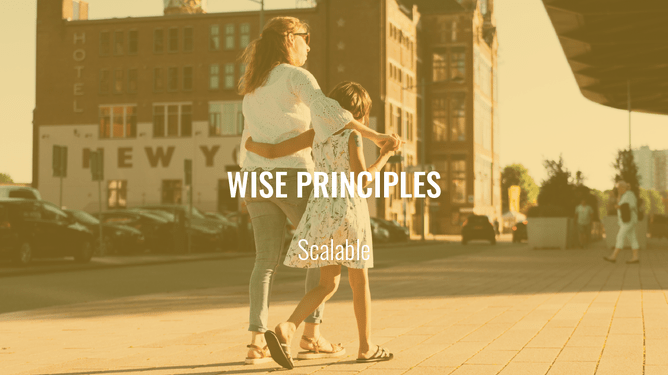Alongsiders' vision is to see Alongsider movements grow around the world, starting with a few groups in each country, and then growing to hundreds or even thousands of Alongsiders who choose to follow Jesus by lovingly walking alongside vulnerable children. Such a movement cannot be made, because it is driven by relationships. But by training local partners to mobilise alongside in a relational way, the movement is scalable.
Scalability simply means using systems, methods and resources that will be sustainable as the movement grows from hundreds to tens of thousands. Alongsiders movements are based on relationships. Alongsiders Europe builds relationships with local churches, and with youth workers located in local communities to build relationships with pastors and youth. Alongsiders youth build relationships as a group and individually with their brothers and sisters. These relationships are self-generating and self-sustaining. Systems and methods are used to mobilise and support the Alongsiders, but once the Alongsiders are trained and released, the movement is self-sustaining.
Scalability within Alongsiders is limited by the number of youth workers that can be supported and their capacities, the provision and dissemination of curricula and training materials and the cost of holding annual training camps. These are there to support Alongsiders and their relationships, but they need human and financial resources. For leaders and organisers, making scalable decisions generally means maximising the relationships and minimising the limits and burdens on them. Projects and programmes (and companies) can also be scalable, but Alongsiders is a relational movement rather than a project or programme.
Leaders within relational movements need to exercise self-control, as they can easily slip into project- or programme-oriented mindsets that are not scalable. They may consider taking the lead or taking control 'for a while' in order to achieve results. While such action may be effective in the short term, it creates the wrong expectations and diminishes the role of relationships. Relational movement and scalability go hand in hand. Leaders in relational movement need to hold back to allow relationships to flourish, but sometimes this is easier said than done. The following story shows what can happen when movement decision-making is framed by a relational approach.
I (Craig) am visiting the Alongside movement in Malawi, where the people are poor and live in simple mud or brick houses with dirty floors. The families here have many children to feed and they struggle to make ends meet. Chikondi, my host, is a lively young Malawian woman with a quick smile, who likes to wear bright colours. Today she is wearing a bright green and orange flower blouse. She introduces me to her 'little sister', Traires, who is thirteen years old.
As one of seven children, Traires is happy to have Chikondia as a Alongsider. Every morning, her mother hikes for hours up a nearby mountain to collect firewood to sell for scraps of money. They persevere, but there is not much to do. Traires doesn't see her mother much. Chikondi told me that she visited Traires yesterday and Traires told her that she has no soap to wash herself with. At thirteen, cleanliness is starting to become more important to her. Can Chikondi help?
I feel torn inside. Soap costs almost nothing. Children in our movement struggle with the most basic necessities of life - surely we can make sure they all have a bar of soap? My thoughts are interrupted by Chikondi, who tells me: 'So I took her to the local market and we bought a few small things: soap, a comb, a small flannel. It felt good. I was happy to help her. I am humbled and grateful that we gave Chikondi the space to be generous. Although she is very poor herself, Chikondi is discovering the joy of giving.'
Within the Alongside movement, many of its little brothers and sisters are economically poor. In some countries, their lives are at stake for lack of a few euros a month. If Alongsiders leaders raised money to help children like Traires, many people would contribute, but the following guidelines are intended to help leaders think carefully about how to respond to overwhelming needs. Although these guidelines focus on the principle of scalability, all four W.I.S.E. principles are present.
The generosity of Alongsiders
If Alongsiders International were to use outside money and resources to solve problems for younger brothers and sisters, young people serving as Alongsiders would no longer be encouraged to give from their own resources, thus losing the opportunity to be generous and become part of the solution themselves. Generosity is an important aspect of discipleship that we want to nurture, and coming in with outside funds would undermine that.
The choice of younger brother or sister
If Alongsiders International were to provide the young siblings with outside money and resources, the Alongsiders would be pressured to choose family members and friends as their little brothers and sisters instead of choosing the most vulnerable children in their community. In many cultures, the expectation - even the demand - is that if your own family and friends are struggling with poverty, you share financial relationships with them first.
The pressure to become a programme
When it became known that Alongsiders International was helping people financially, the staff would be inundated with requests, because in certain areas many young brothers and sisters were in need. If these requests were not met or if some families seemed to receive more than others, there would be jealousy and anger. In no time, the staff would be running a top-down, non-scalable, centralised programme instead of mobilising a grassroots movement for discipleship.
The ability to help more children
A growing Alongsider movement can help many more children than a non-scalable programme. As we saw earlier in an example from Cambodia, 99% of Alongsiders' little brothers and sisters there attend school. That is a much higher percentage than among their peers. Many Alongsiders help their siblings in practical ways by sharing food, buying school supplies and even paying school fees because they believe their help matters.
Relational movements are effective and powerful, but they are also vulnerable. So it is important to recognise that all programmes are not bad. In some situations, an Alongsider may seek out a local ministry or organisation with a programme to help children. But Alongsider movements must be wary of becoming programs and setting aside their true potential in the process.
(Used with permission from: 'The Alongsiders Story - equipping one generation to reach the next' by Craig Greenfield and Andy Gray)

